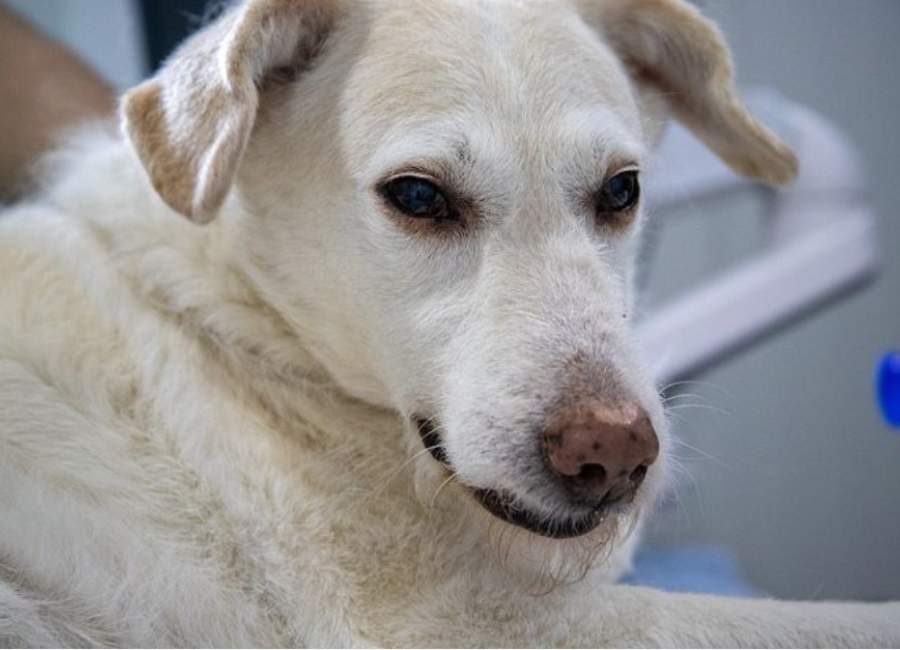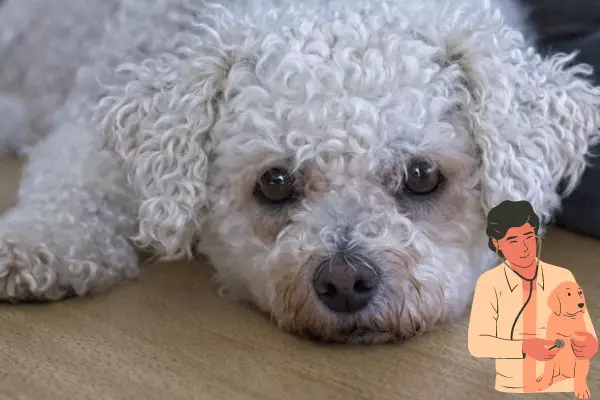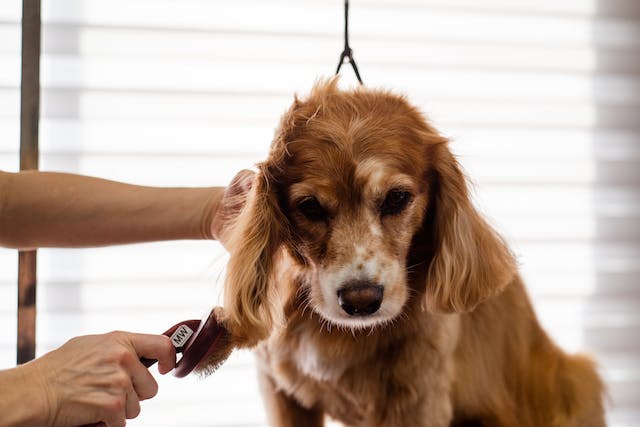10 Reasons For Dog Coughing And Not Eating

In this blog post, we will explore some common reasons for your dog coughing and not eating, and what you can do to help them.
Have you noticed your furry friend coughing and not showing any interest in their favorite treats?
It’s natural to feel worried about your dog’s health when they’re not feeling well.
As a pet parent, it’s essential to identify the root cause of the problem and take necessary actions to ensure your dog feels better soon.
So, read on, and let’s help your furry friend feel better in no time!
Why Is My Dog Coughing And Not Eating
There could be several reasons why your dog is coughing and not eating. Coughing could be a symptom of kennel cough, tracheobronchitis, or other respiratory illnesses.
Not eating could be due to a variety of reasons, including pregnancy, dental problems, or gastrointestinal issues.
It is best to take your dog to a veterinarian to determine the underlying cause of these symptoms and receive appropriate treatment.
Learn more about dogs hiding under beds and not eating.
Reasons why your dog is coughing and not eating
Here are some common reasons why your dog is coughing and not eating:
1. Respiratory infections
Coughing and loss of appetite in dogs can be caused by respiratory illnesses.
Kennel cough is a highly contagious respiratory ailment caused by a bacterial and viral mix.
Pneumonia is a pulmonary infection caused by bacteria, viruses, or other organisms.
Canine influenza is a viral infection that produces respiratory symptoms such as coughing, sneezing, and loss of appetite in dogs.
Therapy for respiratory infections is determined by the type of infection and the severity of the symptoms.
Antibiotics may be prescribed in some circumstances to treat bacterial infections.
Supportive therapy, such as rest, fluids, and cough suppressants, may be advised in other situations.
Vaccination can also help prevent some respiratory illnesses.
2. Allergies
Environmental allergies, such as pollen, dust, and mold, can cause respiratory problems and a loss of appetite in dogs.
Allergies can cause respiratory system irritation, resulting in coughing and difficulty breathing. They may also cause nausea and a loss of appetite.
Allergies can be managed by avoiding the allergen, taking antihistamines or steroids, or undergoing desensitization therapy.
Collaborating with a veterinarian can aid in the identification of the specific allergen and the development of an effective treatment strategy.
3. Kennel Cough
Heartworm illness is a parasitic ailment spread by mosquitos.
Worms can develop and dwell in the heart and lungs of dogs, causing inflammation and respiratory harm.
This can result in coughing, weariness, and loss of appetite.
Heartworm disease treatment can be complicated, involving a combination of medicine, rest, and supportive care.
It is critical to adhere to your veterinarian’s treatment plan and regularly evaluate your dog’s development during treatment.
4. Heartworm Disease
Heartworm illness is a parasitic ailment spread by mosquitos.
Worms can develop and dwell in the heart and lungs of dogs, causing inflammation and respiratory harm.
This can result in coughing, weariness, and loss of appetite.
Heartworm disease treatment can be complicated, involving a combination of medicine, rest, and supportive care.
It is critical to adhere to your veterinarian’s treatment plan and regularly evaluate your dog’s development during treatment.
5. Gastrointestinal Problems
Inflammation and irritation in the digestive tract can be caused by digestive disorders such as gastroenteritis, inflammatory bowel disease, or intestinal obstructions.
This can result in nausea, diarrhea, and a loss of appetite.
Medication, dietary changes, and other therapy may be used to treat gastrointestinal disorders in dogs.
It is critical to adhere to your veterinarian’s treatment plan and regularly monitor your dog’s development.
6. Cancer
Coughing, wheezing, and loss of appetite can be caused by tumors in the respiratory or gastrointestinal systems.
As the tumors develop in size, they can impede the airways or digestive tract, causing further symptoms.
Surgery, chemotherapy, radiation therapy, and other therapies may be used to treat cancer in dogs.
It is critical to collaborate with your veterinarian to design a treatment plan that is suited to your dog’s individual needs and to closely monitor your dog’s progress.
7. Chronic bronchitis
Chronic bronchitis is a disorder characterized by airway inflammation. It might cause coughing and loss of appetite in dogs.
Exposure to irritants such as smoke, dust, or chemicals is a common cause of chronic bronchitis.
Medication for chronic bronchitis may include bronchodilators, steroids, or antibiotics.
It can also assist to avoid irritants that cause symptoms, such as smoke or smog around your dog.
8. Parasites
Coughing and decreased appetite in dogs can be caused by parasites such as lungworms or intestinal worms.
These parasites can induce respiratory or gastrointestinal irritation, resulting in symptoms such as coughing, vomiting, and diarrhea.
Parasite treatment may include drugs to destroy the parasites as well as supportive care to control symptoms.
Regular deworming, for example, can also be beneficial.
9. Foreign Objects
Dogs can inhale or swallow foreign items like grass, twigs, or bones.
These items can get stuck in the lungs or the digestive tract, causing discomfort and inflammation.
A foreign item in the respiratory or digestive system can cause coughing and loss of appetite.
If you fear your dog has inhaled or swallowed a foreign object, seek veterinary attention right once.
To remove the object and avoid future injury, your veterinarian may need to undertake diagnostic testing or surgery.
10. Side effects of medication
Some drugs in dogs can result in side effects such as coughing and loss of appetite.
Certain antibiotics, for example, can cause gastrointestinal distress and decreased appetite.
When starting a new medicine, it is critical to observe your dog’s behavior and report any changes to your veterinarian.
Learn more about signs your dog is in pain.
How to help a dog that is coughing and not eating
Here are some general tips that may help your dog:
- You can try easing your dog’s discomfort by adding honey and lemon to their water or coconut oil to their food.
- Slow feeders and elevated dog bowls can also help if the coughing is caused by respiratory disease.
- Provide a calm environment for your dog, as stress and anxiety can worsen coughing and cause a loss of appetite.
- If your dog is coughing up phlegm, make sure to provide plenty of water to prevent dehydration.
- Offer small, frequent meals of high-quality, easily digestible food to entice your dog to eat. Options include boiled chicken, boiled hamburger, or cooked rice. The food should not be seasoned or cooked with fat.
- If your dog is not drinking enough water or is becoming dehydrated, consider adding a small amount of low-sodium chicken or beef broth to their water bowl to encourage drinking.
- If your dog is not eating, it is important to monitor their blood sugar levels if they are diabetic and to follow your vet’s instructions regarding insulin dosage.
- If coughing persists or worsens, and if your dog continues to refuse food, it’s best to consult with a veterinarian as soon as possible.
How to Prevent Coughing and Lack of Appetite in Dogs
There are several ways to prevent coughing and lack of appetite in dogs.
Here are some common ones:
- Vaccinate your dog against kennel cough and other common infectious diseases.
- Keep your dog clean and well-groomed to prevent skin and coat problems.
- Provide your dog with a healthy, balanced diet that meets its nutritional needs.
- Avoid giving your dog any human foods that may be toxic or harmful to them.
- Keep your dog’s living environment clean and free from allergens and irritants.
- Exercise your dog regularly to keep them physically and mentally stimulated.
- Seek prompt veterinary care if your dog shows any signs of illness or discomfort.
- Follow your veterinarian’s recommended preventative health care schedule.
- Keep your dog away from other dogs that may be sick or contagious, especially in crowded or high-risk areas such as dog parks or boarding facilities.
Implementing these measures can help prevent coughing and lack of appetite in dogs and promote overall health and well-being.
Symptoms to look out for if a dog is coughing and not eating
If your dog is coughing and not eating, there could be several possible causes.
Some symptoms to look out for include a honking cough that sounds like a goose, which could indicate tracheal collapse.
A dry, hacking cough that worsens with exercise or excitement could be a sign of chronic bronchitis.
Other possible causes of coughing in dogs include heartworm, kennel cough, or other respiratory infections.
If your dog is not eating, it could be a sign of illness. It is important to take your dog to the vet for a proper diagnosis and treatment.
When to Seek Veterinary Care
If your dog is coughing and not eating, it is best to seek veterinary care if the coughing persists for several days with no signs of subsiding.
Additionally, if your dog is lethargic, having difficulty breathing, coughing up blood, or experiencing persistent vomiting or diarrhea, it is important to seek immediate veterinary care.
However, if your dog has been coughing for less than an hour and has no other concerning symptoms, you may be able to monitor them at home and call your veterinarian for advice.
Questions You May Have
What are some common causes of coughing and lack of appetite in dogs?
Some common causes include respiratory infections, heartworm disease, kennel cough, congestive heart failure, or foreign objects lodged in the throat or lungs.
Can anxiety or stress cause a dog to cough and lose their appetite?
Yes, anxiety and stress can lead to an upset stomach, which may cause a dog to cough and lose their appetite.
Is coughing and not eating always a sign of a serious condition in dogs?
Not always. Sometimes, a mild illness or a mild case of stress can cause coughing and loss of appetite.
However, it is always best to consult with a veterinarian to determine the underlying cause.
What should I do if my dog is coughing and not eating?
The first step is to schedule an appointment with your vet to determine the underlying cause.
Your vet may recommend diagnostic tests or prescribe medications to help alleviate the symptoms.
Can I give my dog human cough medication if they are coughing and not eating?
No, you should never give your dog human medication without the approval and prescription of a veterinarian.
Some human medications can be toxic to dogs and may cause serious harm.
Can nutritional deficiencies cause a dog to cough and not eat?
Yes, nutritional deficiencies can lead to weakness, lethargy, coughing, and loss of appetite in dogs.
It is important to ensure that your dog is receiving a balanced and nutritious diet appropriate for their specific needs.
Conclusion
In conclusion, if your dog is coughing and not eating, it’s important to take action and seek veterinary care.
While there are many potential causes for these symptoms, only a professional can accurately diagnose and treat your furry friend.
Remember to keep an eye on your dog’s behavior and health, and don’t hesitate to reach out to your vet if you have any concerns.
With the right care and attention, your dog can get back to feeling happy and healthy in no time!



![How to Know if Your Dog is Deaf [12 Signs & Tips] How to Know if Your Dog is Deaf](https://petcreeks.com/wp-content/uploads/2023/09/medicine-5003631_640-1.jpg)


